You are here
New Releases
ICPD UNFPA WCARO PHOTO BOOK
This book of photo essays highlights some of the work that UNFPA’s West and Central Africa regional office has been engaged since it was set up in 2013 in Dakar, Senegal.
It is also in celebration of two milestones of immense importance globally as well as in Africa the 50th anniversary of the setting up of the United Nations Population Fund (UNFPA) and the 25th anniversary of the International Conference on Population and Development (ICPD).
Foreword by
Mabingué Ngom,
Director of UNFPA West and
Central Africa Regional Office (WCARO)
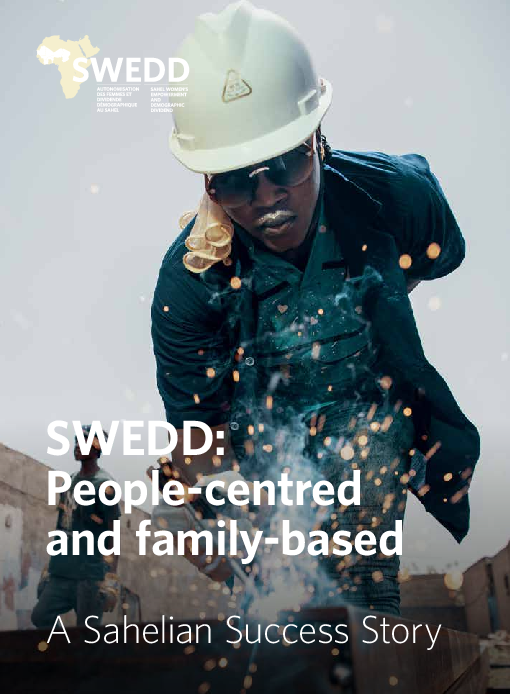
SWEDD: People-centred and family-based
“Young people make up 75 per cent of the population SWEDD countries which represent a huge potential of assets for the private sector. Investing in human capital will determine whether or not Africa is able to acquire human capital that is commensurate with its desire for emergence.”
Mabingué Ngom, UNFPA Regional Director for West and Central Africa Office - WCARO
SWEDD is a regional project that unites these six western and central African countries with the main objective of “accelerating the demographic transition, to spur the demographic dividend, and to reduce gender inequality in the Sahel region”. SWEDD was officially launched on November 2nd, 2015 in Niger’s capital city of Niamey. Niger also happens to chairs the Regional Steering Committee. When it was initiated SWEDD had an operational time frame that was scheduled to run until the end of 2018. However, owing to an impressive list of achievements on all of SWEDD’s intervention strategies in the region the 2018 time scale has been extended to 2023 and neighbouring states have expressed their interest to join the inspiring and transformational SWEDD initiative.

UNFPA WCARO Delivery Unit concept note
UNFPA WCAR’s work in these past few years have attracted more funding thus giving the organization the ability to have a bigger impact on women, adolescent and young people in the region and to adopt ‘new ways of working’ to be more efficient and effective.
This increase in funding created a greater demand and expectation for the region to strengthen its capacity to absorb new grants and implement innovative programmes while accelerating the delivery of results of existing programmes. This cannot be achieved without innovative mechanisms for anticipating, preventing and quickly addressing the bottlenecks and risks hindering programme delivery.
In addition to strengthening its Results Based Management (RBM) culture, WCARO has also been reflecting on new ways of working that are more geared towards programme integration, better coordinated funding arrangements and resource allocation, and timely and better support to country offices. This goal cannot be achieved without managing risks and anticipating challenges that could affect operations and programme implementation.
It is against this background that UNFPA WCARO is setting up a Delivery Unit with the sole objective of helping managers deliver planned results in RIAP and country programmes to support the Strategic Plan 2018-2021 three transformative goals of: 1) end preventable maternal deaths; 2) end unmet need for family planning; and 3) end gender-based violence and harmful practices.
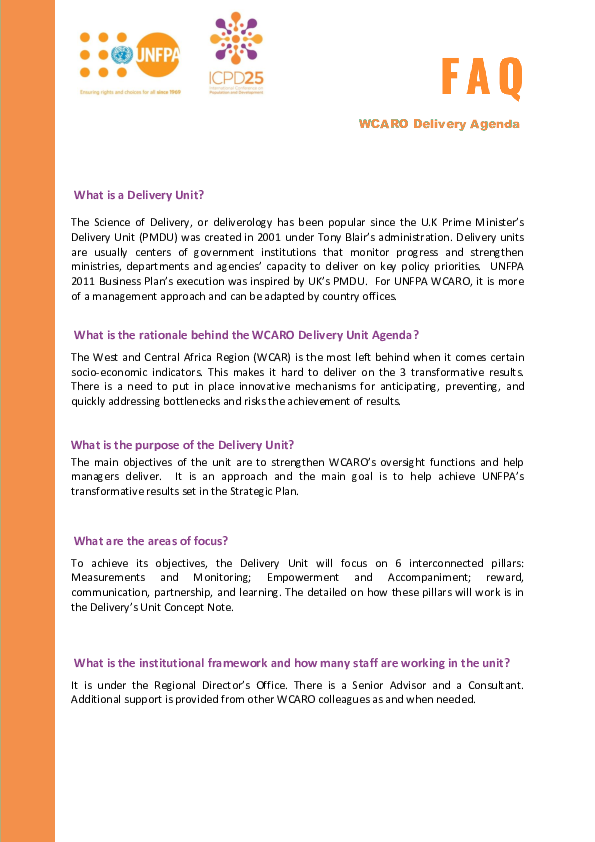
WCARO Delivery Agenda
The Science of Delivery, or deliverology has been popular since the U.K Prime Minister’s Delivery Unit (PMDU) was created in 2001 under Tony Blair’s administration. Delivery units are usually centers of government institutions that monitor progress and strengthen ministries, departments and agencies’ capacity to deliver on key policy priorities. UNFPA 2011 Business Plan’s execution was inspired by UK’s PMDU. For UNFPA WCARO, it is more of a management approach and can be adapted by country offices.
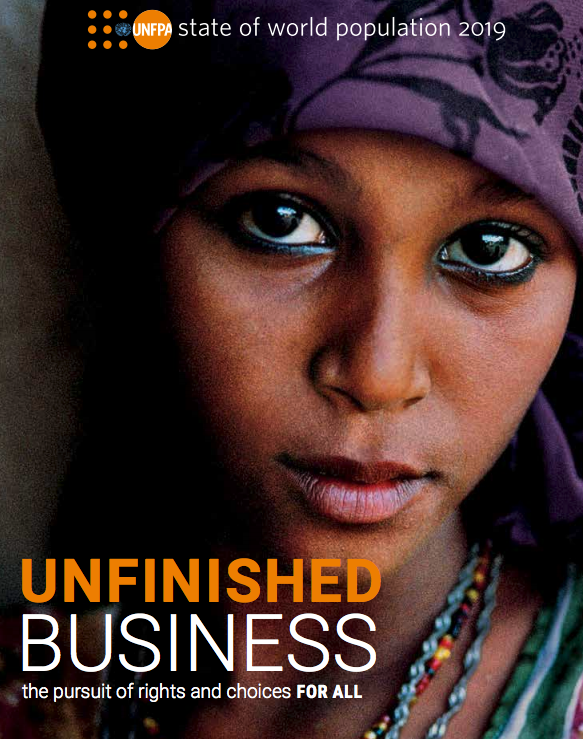
State of World Population 2019
Fifty years ago, it was hard for women to obtain contraception and relatively easy to die giving birth. Many women were unable to decide whom and when to marry, and when or whether to have children.
A worldwide movement to give women real choices in life culminated in the 1994 International Conference on Population and Development (ICPD), where a consensus was reached about the links between women’s empowerment, sexual and reproductive health, and rights and sustainable development.
Demographic Dividend in West and Central Africa 2018 Progress Report – Summary
We have completed the first year of our new four-year regional action plan, with activities and initiatives implemented in line with the:
Global UNFPA Strategic Plan 2018-2021 aiming to contribute to the achievement of the 2030 Agenda for Sustainable Development, the African Union (AU) Agenda 2063, and its roadmap on the Demographic Dividend.
2018 Progress Report on Demographic Dividend in West and Central Africa
Significant progress has been made in the provision of frontline reproductive health services to those in dire need, but much more still needs to be done. As part of the Ouagadougou Partnership, in which UNFPA is a core partner, the coordinated interventions of the partnership’s actors have enabled an additional 1,398,000 women to access and use modern contraceptive methods (63 per cent of target by 2020), from 2016 to 2018. Furthermore, UNFPA has contributed 70% to meeting WCARO countries’ contraceptive needs in 2018, while two other partners contributed the remaining 30%.

Presentation of Progress Report 2018: The Demographic Dividend in West and Central Africa UNFPA Regional Office for West and Central Africa
Presentation of Progress Report 2018: The Demographic Dividend in West and Central Africa UNFPA Regional Office for West and Central Africa January 21, 2019, UNFPA HQ, New York.
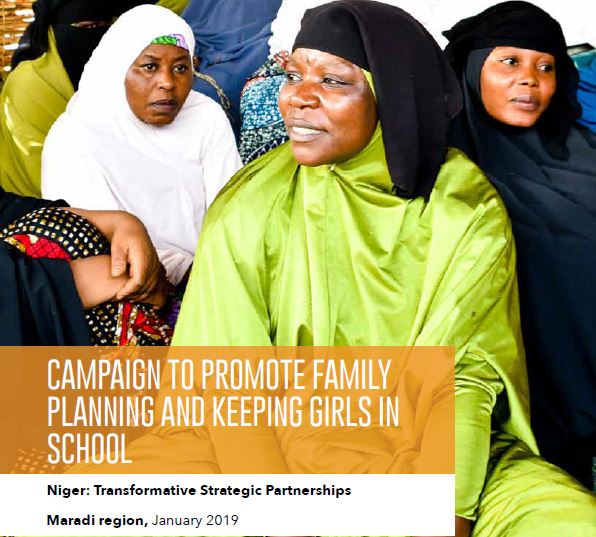
Campaign to promote family planning and keeping girls’ in school
Niger has one of the highest population growth rates in the world (3.9 per cent in 2012). The population is extremely young: people under 15 account for more than half of the total population (51.7 per cent). The extreme youth of the Nigerien population is related to its high fertility rate, which is six children per woman on average, linked to the strong desire to have children both among men (11 children) and women (9 children), and the low use of family planning (12.3 per cent).
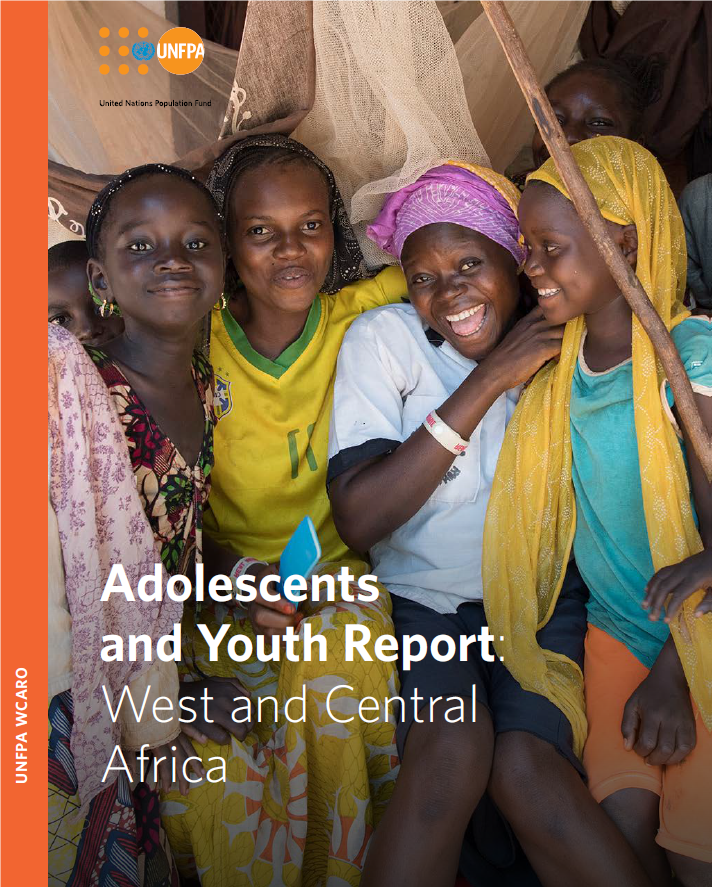
Adolescents and Youth Report: West and Central Africa
The Adolescents and Youth Report provides a comprehensive overview of the situation of young people in West and Central Africa today. It gives a detailed data and narrative analysis of the sexual and reproductive health, education, employment, social protection, gender issues, and emergency challenges that young people face in this region. The Report is meant to guide policy makers, programme implementers, young people and other key stakeholders to develop multisectoral policies and programmes that respond to the needs of young people. UNFPA urges government partners, UN agencies, youth groups and CSOs to use the Report's findings and recommendations to take actions and develop evidence-based policies and programmes that respond to the needs of young people.